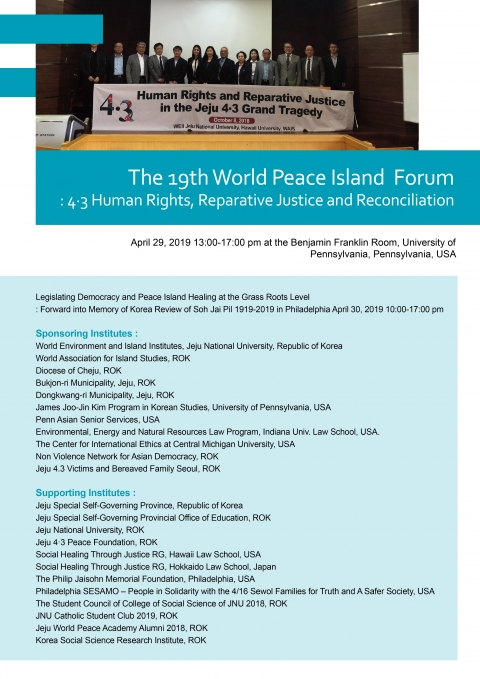
Houston Hall 218 (Ben Franklin Room)
On January 17, 2019, eighteen Jeju 4.3 survivors were found not guilty after a retrial of their cases before a Korean court on Jeju Island. This was the first decision that, the court announced, allowed them to recover their human rights as survivors of the “Jeju 4.3” massacre which started on March 1, 1947 and lasted until August 14, 1948 under the control of the U.S. army. Those Jeju people have come forward to tell their stories of that tragedy and have demanded compensation. No special pleading about the exigencies of wartime will suffice to assuage the American conscience for such tragedies as recounted by two Jeju 4.3 survivors in their testimonies given at the University of Chicago in April of 2018. Two female survivors told the audience about their lost villages along with a video documentary, "Detained: Untold stories of female survivors of two 4.3 lost villages.” The number of victims was more than 30,000 people. It was argued that the “Basic Principles and Guidelines on the Right to a Remedy and Reparation for Victims of Gross Violations of International Human Rights Law and Serious Violations of International Humanitarian Law” formulated by the UN Human Rights Commission in 2005 should be applied to victims of the Jeju 4.3 Tragedy.
In October of 2018, we had Jeju 4.3 Human Rights, Reparation Justice and Reconciliation: there are some broad parallels that connect the 2018 Jeju court finding and the mid-1980s U.S. court coram nobis cases. Both began in the violence of the 1940s. Both involved apparently grave legal system injustices, followed by decades of silence. Both involved continuing demands, decades later, to have justice restored in order to heal persisting wounds and restore the dignity of individuals and communities. Both eventually turned to the courts and the rule of law in democratic societies, invoking language of civil and human rights. Both involved extraordinary proceedings that, in essence, made claims for reparative justice. We would like to connect the petition to the importance of U.S. participation in process of Jeju 4.3 reconciliation.We keep in mind that, in April 2018, President Moon Jae-in delivered a strong, more detailed apology at a memorial ceremony commemorating the 70th anniversary of Jeju 4.3 and its victims. President Moon offered a “profound apology” and “deepest sympathy” to the surviving victims, bereaved families and following generations stigmatized by guilt-by-association for their continued suffering. Jeju 4.3 survivors need enduring social healing. We try to share common goals which are helpful to building peace education for Korea which is to go beyond the Tragedy keeping Jeju peace traditions through launching of 6+1 Culture Forum " the April 3rd Jeju Education International Symposium " in November of 2018.
 James Joo-Jin Kim Center for Korean Studies
James Joo-Jin Kim Center for Korean Studies